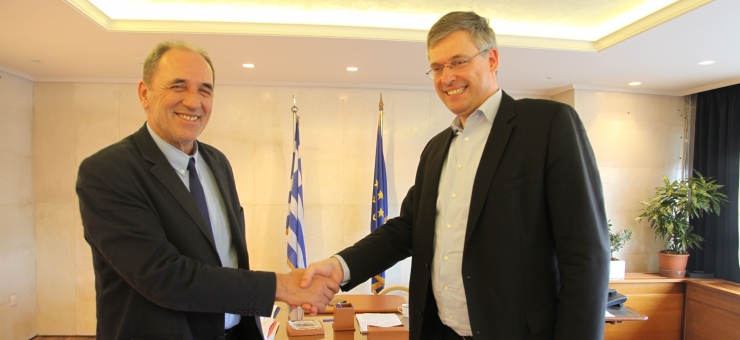Roethig meets Greek ministers and unions in Athens

UNI Europa Regional Secretary Oliver Roethig met Greece’s new Minster for Economy and called on Eurozone Ministers to give the country “space to breathe” following the latest breakdown in bailout talks.
“The people of Greece have taken a democratic decision that five years of austerity, of hardship and of pain have failed, and they have chosen a new path. The Eurozone must respect that,” Roethig said during talks in Athens.
“Greece must be given time and space to obtain the financial means to fairly negotiate its debt. A programme bridge until June this year is the best pathway to achieving this.”
Roethig is the first European trade union leader to meet the Greek government following its election in January. Economics Minister George Stathakis assured him that he remained positive a deal could be reached with the Eurozone.
“I am very optimistic that they will give us some space,” he said. “Not as much space as we’d like but some space.”
On day one of his visit, Roethig also met with the leaders of UNI Europa’s largest Greek affiliates to discuss how UNI can support workers during a period of unprecedented humanitarian crisis and a near-complete breakdown in union rights.
The Greek affiliates explained their individual difficulties since austerity measures came into effect. There was a clear consensus that bringing back collective bargaining and labour rights must be a priority for the new government and that there must be European cooperation on re-establishing industrial relations. Austerity has seen union membership plummet and members discussed new ways in which to attract workers back into the labour movement.
Under its last government and under the enforcement of the so-called Troika, Greece was the target of the most extreme austerity policies implemented in Europe in the last decade. Austerity has seen the country’s GDP drop by 25% per cent and has failed to increase productivity and competitiveness. Over a quarter of the workforce are now unemployed and real income is down 21%. Hundreds of thousands have lost jobs, homes and livelihoods.
In an interview with ERTOpen, Roethig called on the new government to make the return of collective bargaining a key priority in tackling the humanitarian crisis. “One of the first issues this new government needs to tackle is to bring back collective bargaining and proper and fair labour laws and I’m confident this will happen” Roethig said.
“This must include the reinstatement of previous collective agreements, the establishment of a rigorous framework for protection against mass redundancies and the restoration of the institution of labour arbitration.”
Day Two of the visit will see Roethig meet Greece's Labour Minister. The situation in Greece will be followed-up at the next UNI Europa Management Committee in March where affiliates will discuss how to further assist Greek workers.

